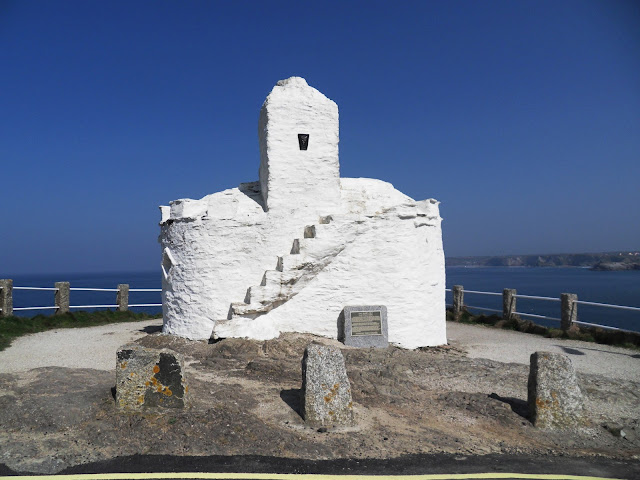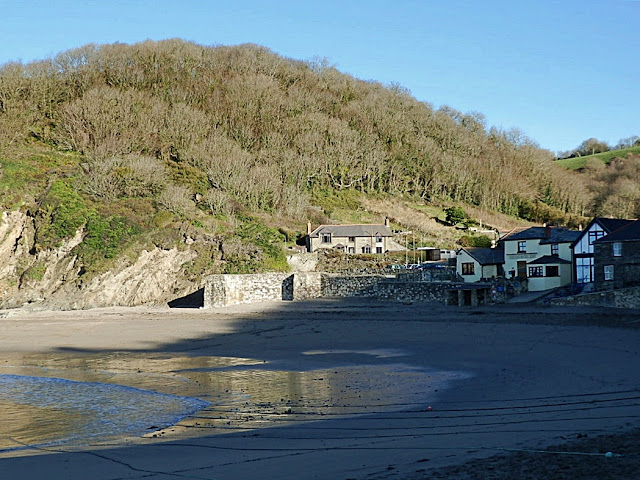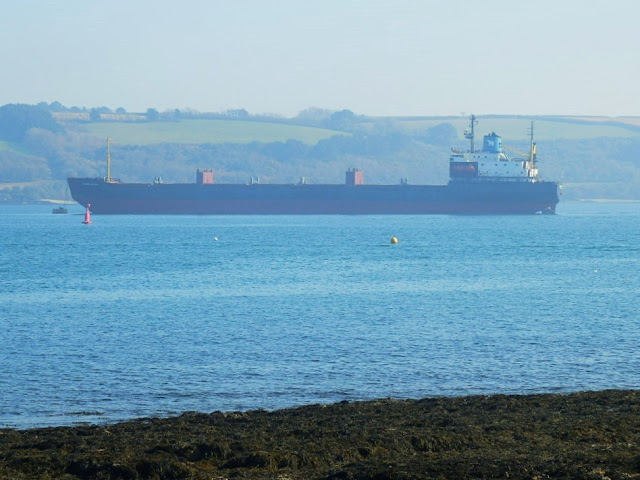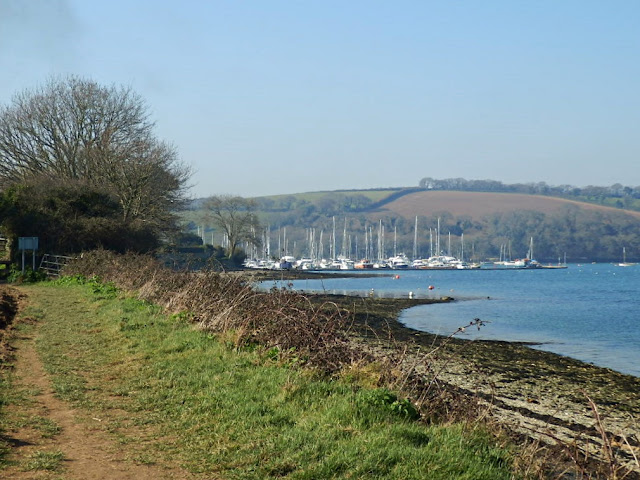Thursday 7 March 2019
Newquay, Cornwall - Wonderful Beaches, Stunning Views
A while back, when I snapped these photos, we had lunch at the Fort Inn, Newquay. The first three photos were taken from the Inn where there are stunning views.
The photo above is looking right - along the popular Towan Beach. Not too many people about out of season.
The photo above is the Fort Inn's terrace and the photo below is Newquay Harbour looking left from the terrace.
After lunch we headed back towards the main centre at Newquay. Towan Island (below) always fascinates me. The only access to the house is over the slender bridge. The island is surrounded by water when the tide is in.
And finally looking back in the direction of the Fort Inn.
Newquay, with it's wonderful beaches, gets very busy in the summer season - several good surfing beaches. It has been voted as "one of the nation's favourite seaside towns."
Also see: The Hue and Cry Made From A Huers Hut At Newquay, Cornwall
Wednesday 6 March 2019
The Hue and Cry Made From A Huers Hut At Newquay, Cornwall
The photos are of a Huers Hut overlooking the sea at Newquay, Cornwall. It is said to date from the 14th century - but could well be older - and was used as a look-out when shoals of pilchards were expected in the bay.
The huer would sound his horn raising a hue and cry alerting townsfolk to the arrival of the fish.
By means of hand signals the huer enabled the fishermen to position their boats and encircle the shoals into their nets.
Previous to being used by a Huer the hut may have been a hermitage. Externally the building has a large, typically Cornish, late medieval chimney and a narrow stairway leading to the roof.
Though I have used the words hue and cry above there are other suggestions as to how the phrase originated. Wikipedia, for example, suggests the following:
By the Statute of Winchester of 1285 it was provided that anyone, either a constable or a private citizen, who witnessed a crime shall make hue and cry, and that the hue and cry must be kept up against the fleeing criminal from town to town and from county to county, until the felon is apprehended.
See also : Newquay Harbour in 1875 and 2019
Tuesday 5 March 2019
Daphne Du Maurier Featured On Large Cornish Mural
The author Daphne Du Maurier features on a mural in St.Austell. Many of her books are set locally in Cornwall - such as Jamaica Inn, Rebecca, The House on the Strand and so on.
The mural, by Janet Shearer, depicts well known people (at least well known to local residents!) who live or lived near to St.Austell - one of these being Daphne Du Maurier. She is in the premier position, the lady at the top of the art work looking over a balcony.
The mural is a reproduction, four times the size of an original painting. This was photographed and then scaled up and printed on aluminium sheets which were then affixed to the building.
Amongst the diners at the fictional 'China Cafe' are Nigel Martyn (Former England Goalkeeper), Jemma Simpson (Olympic Athlete), Richard Sharp (England Rugby Player), Beatrice Rogers (First Female Deaconess in the Methodist Church), AL Rowse (Historian and Poet), Walter Hicks (Founder of St Austell Brewery), Silvanus Trevail (Architect), William Cookworthy (Discoverer of China Clay in Cornwall), John Nettles (Actor), Bishop Colenso (First Anglican Bishop of Natal), Captain Percy Phillips (Founder of the Cornwall Aviation Company) and Jack Clemo (Writer and Poet).
Monday 4 March 2019
Polkerris The Fortified Cove, Cornwall
Polkerris cove, Cornwall, is quietly tucked away from the hectic world down a very narrow lane. The village itself is small but has the advantage of having the Rashleigh Inn right on the beach - a perfect place to watch the sun go down.
The photo above was taken from the cliff top coastal path.
The name Polkerris is a bit of a puzzle. History shows it was once known as Polkeryes. It is believed that the first part of the name may have originated as 'Porth' meaning harbour or haven in the Cornish language. Later the second part of the name became 'kerris' meaning to fortify or enclose - which ties in with the photo below.
Yes canons, and they are embedded in the harbour wall - part of the fortifications perhaps. It is thought that they are from the Napoleonic era.
During the 18th century the harbour was developed for pilchard fishing. A quay was constructed around 1735, together with fish curing cellars.
Nowadays Polkerris is a popular place for visitors to enjoy the small beach, rock pools, watersports and the spectacular views across St.Austell Bay.
The Inn on the beach has a range of food and drinks.
Sunday 3 March 2019
Road Names and the Cornish Language
Many street signs in Cornwall are gradually being altered to show the name in both the Cornish and English languages.
Cornish isn't spoken generally but there seems to be a desire to keep the language alive. You may have read on my Mousehole Post that the last native speaker of the Cornish language is believed to have been a Dolly Pentreath. She lived in Mousehole and died in 1777.
There are night classes for the Cornish language locally - my son went to a few.
For interest here are a few Cornish words that you may see if in Cornwall. Like Tre, for example, which means home. Many place names start with this (for example: Trethurgy, Tregony, Tresillian) - so it is easy to see how the names came about.
Here are a few more Cornish language words:
Alls - cliff
Bod - a dwelling; Bownder - a lane; Brea - a mound; Bryn - hill
Carn - rock pile; Carrack - rock; Coombe - valley; Creek - burial ground
Dennis - fort; Dinnis - fort; Dowr - water
Eglos - church; Ennis - island
Forth - road
Garth - garden; Glas or Glaze - blue / green; Good - lowland
Hayle - estuary; Hen - old; Huel - mine
Kelly - copse; Kynance - steep valley
Lan - church enclosure; Lys - court
Maen - stone; Mor - sea; Mur - big
Nan - valley; Noon - lowland
Olds - cliff
Parc - field; Pen - head; Penwith - headland tip; Ponds - bridge; Porth - cove; Praze - meadow
Red - ford; Reeth - red; Ryn - steep slope
Sans - holy ground; Scath - boat; Sten - tin
Tewen - sand dune; Toll - hole; Tre - home; Treath - beach; Tren farmstead; Ty - house
Vean - small; Veor - great
Wartha - upper; Wheal - mine; Win - white; Withen - tree; Woon - lowland
Yet - gateway
Zawn - gorge.
I think that will do!
Saturday 2 March 2019
St. Mylor Church, Cornwall
A shortish post today following on from yesterday's post: A Perfect Day At Mylor Cornwall. While at the village we also visited the local church.
The church was founded over 1500 years ago by St. Mylor (St. Melorus). As with many Cornish saints of the Celtic Church he has links also with Brittany. It is generally quoted that he died in 411 A.D.
The present church is of Norman origin, circa 1100 AD, and has many interesting features such as: the Norman Doorway, a 15th century Rood Screen, Elizabethan Pulpit and a 13th century font.
Friday 1 March 2019
A Perfect Day At Mylor Harbour
Yesterday was quite extraordinary weatherwise. It felt more like summer than February - at times there was even a heat haze over the water.
Luckily we were at Mylor harbour where the boats glinted in the sunshine.
As we tend to do, we walked along the river path, so very peaceful and then returned to the harbour. The next six photos are from the walk.
The above photo shows the heat haze, I mentioned earlier - as the large boat made its way along the River Fal.
Below is looking inland where a farmer had just ploughed his field ready for planting.
And finally we returned to the boats and Mylor Harbour. Such a perfect day.
P.S. The photo below is how February 2018 looked in Cornwall. What a difference, almost unbelievable!
See also: St. Mylor Church, Cornwall
 |
Subscribe to:
Posts (Atom)
FEATURED POST
NEWQUAY, LUNCH & OTHER PHOTOS
A few random photos from our week. We decided to head for Newquay and lunch at the Forte Inn , one of our favourites as there are such l...

































